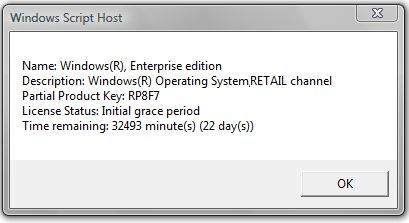Last Updated on July 29, 2024 by Arnav Sharma
Microsoft’s command-line licensing tool is slmgr.vbs. The name actually stands for Windows Software Licensing Management Tool. SLMgr script allows users to query the current installation and see details about Windows 7/8 installation and its activation and licensing status.
Most of the licensing operating in Windows 8 can be done via a graphical user interface. If you’re a power user, you can access all options, flags and settings of the slmgr.vbs command script. To run the script, log on with a user account with administrator rights, and open an elevated Command Prompt window.
Options in SLMGR :
1. slmgr -dli (display the current license information)
2. slmgr -dlv (stands for display license information, similar to -dli switch but with more information)
3. slmgr -ipk xxxxx-xxxxx-xxxxx-xxxxx-xxxxx (enter a new or replace the current product key with the new product key supplied at xxxxx-xxxxx-xxxxx-xxxxx-xxxxx)
4. slmgr -xpr (shows expiration date)
5. slmgr -ato (activate Windows 8 license and product key against Microsoft’s server)
6. slmgr -skms activationservername:port (set the KMS server and the port used for KMS Activation)
7. slmgr -upk (uninstall current installed product key and return license status back to trial state)
8. slmgr -rearm (reset the licensing status and activation state of the machine)
9. slmgr -ckms (clear the name of KMS server used to default and port to default)
FAQ – Extend Your Windows License Using slmgr
Q: What is SLMGR?
A: SLMGR (Software Licensing Management Tool) is a command-line tool in Windows that allows you to activate and manage the licensing of your Windows operating system.
Q: How can I activate my Windows using SLMGR?
A: To activate your Windows using SLMGR, you can open an administrator command prompt and then run the following command: “slmgr /ato”.
Q: What is the command to open an administrator command prompt?
A: To open an administrator command prompt window, you can right-click the Start menu and select “Command Prompt (Admin)” or “Windows PowerShell (Admin)”.
Q: How can I change the product key using SLMGR?
A: To change the product key using SLMGR, you can open an administrator command prompt window and then run the following command: “slmgr /ipk [new product key]”.
Q: What is the command to remove the product key?
A: To remove the product key, you can open an administrator command prompt window and then run the following command: “slmgr /upk”.
Q: What is a KMS host key?
A: A KMS (Key Management Service) host key is a type of product key that allows you to activate multiple computers in a network without the need for individual activation.
Q: How can I uninstall my product key using SLMGR?
A: To uninstall your product key using SLMGR, you can open an administrator command prompt window and then run the following command: “slmgr /cpky”.
Q: How do I enter a new product key using SLMGR?
A: To enter a new product key using SLMGR, you can open an administrator command prompt window and then run the following command: “slmgr /ipk [new product key]”.
Q: How can I force Windows to attempt online activation?
A: To force Windows to attempt online activation, you can open an administrator command prompt window and then run the following command: “slmgr /ato”.
Q: What is the use of SLMGR in Windows Server?
A: SLMGR is useful for Windows Server activation and management, allowing you to activate and manage licenses for Windows Server operating systems.
Q: How can I “activate windows” on my computer?
A: You can use slmgr to change the product key and activate the system.
Q: What is the command to check the version of “windows 10” installed on my system?
A: To check the version of windows, you can use the command line tool provided in the current windows system.
Q: How do I open an “administrator command prompt window”?
A: To launch a command prompt with administrator access, you can use the following command.as instructions.
Q: Can I activate “windows server 2012 r2” using the command prompt?
A: Yes, for windows server 2012 r2, you can use the command provided by slmgr to activate it.
Q: What is the difference between the “version of windows” I have and other editions?
A: Different editions of windows offer various features. The command will check the product key and display more detailed license information about your current version.
Q: How do I ensure that my “windows 7” product key is valid?
A: You can check the product key you enter to ensure it’s valid before using it on windows 7 or windows server 2008.
Q: What is the “installation id for offline activation”?
A: The installation ID is a unique identifier used to activate due to a connection issue. Once you have the confirmation id, you can use it to activate the system offline.
Q: How do I launch a “command prompt window” with elevated privileges?
A: To launch a command prompt with administrator access, use the following instructions provided by the windows script host.
Q: Can I use the same product key for “windows 10” and “windows 7”?
A: No, windows licenses are tied to specific versions. Ensure people who use the computer have a valid product key for the respective version.
Q: How can I remove a product key from the “windows server 2012 r2” registry?
A: You can use the command provided by slmgr to remove the license and product key from the registry.
